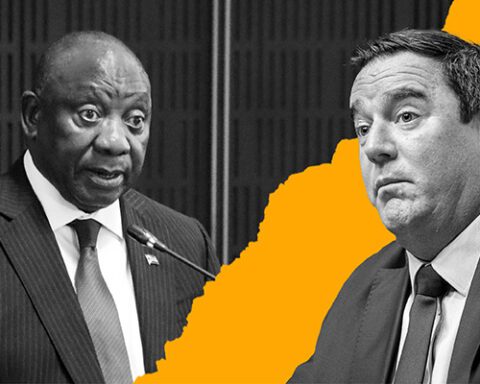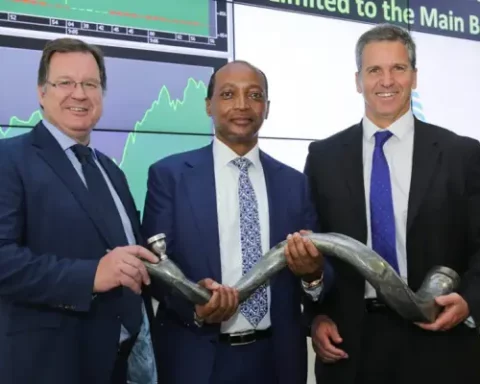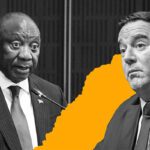For a rudderless vessel, the year-end results for South Africa’s retail banking tanker Absa weren’t half bad. Profit grew by 10% to R22bn, its market share of deposits inched up, and its “active customers” grew slightly to 9.9-million people.
Evidently, investors had expected worse, since its stock raced out of the blocks, rising 2.9% as the numbers were released, before retreating later.
It underlines the extent to which expectations for Absa – a bank formed in 1991 by the merger of the United Building Society, Allied, and Volkskas – remain in the basement, despite the fact it controls more than 20% of banking assets in the country.
It doesn’t help that Charles Russon, who presented the results, is yet another acting CEO plugging a gap that the bank can’t seem to fill for longer than five minutes. “We remain a recovery story. It’s fair to say 2024 as a whole fell short of our expectations,” Russon, the former head of Absa’s investment bank, told shareholders at the presentation.
Still, stand-in CEOs will have harder jobs than announcing many billions in profit and a 7% hike in dividends.
“There’s plenty that must still be done to fix Absa and these results showed that,” says Chris Steward, the head of financials at asset manager Ninety One.
“Absa delivers the lowest return on equity of all the banks, which remains below its cost of capital. But it is gratifying that the CEO is making the right noises about improving capital allocation and returns.”
In his presentation, Russon was clear that Absa has changed its strategy, from trying to win market share to ensuring that the business it does have is more profitable.
He repeated the word “precise” as if it were a mantra: capital allocation must be more precise; loan origination must be more precise; and its balance of opportunity versus profitability must be more precise. It reveals much about what was missing from the bank.
“Everything is about returns [and] everything is about precision,” said Russon.
“Where we see those opportunities, we intend to deploy our risk appetite, discretionary spend [and] investment to make sure we are positioned to maximise on those return-friendly revenues.”
The problem for Absa – and one which Russon is trying to fix – is that the bank’s strategic lurches in recent years meant it had no consistency, and it ended up chasing the wrong things.
When it was owned by Barclays, between 2006 and 2018, it was paralysed by London’s risk aversion, so it lost market share. Once it was again independent, it began lending furiously to recover that lost ground. But its profitability suffered.
So, for example, Absa’s return on equity – a key measure for a bank – now sits at 14.8%, which is lower than Standard Bank (18.5%), FirstRand (20.8%) or Nedbank (15%).
This trade-off – market share for profitability – is one reason Absa’s shares remain the cheapest of all the banks as multiples of both its earnings and its book value, reflecting the lack of confidence by investors.
“Absa is rated poorly because it has a track record of strategic inconsistency, questionable capital allocation and operational missteps. So, yes, the stock might look cheap, but the fact is that it has failed to deliver for investors, and the market doesn’t like that,” says Steward.
Empty benches
Kabelo Moshesha, an analyst at Mazi Asset Management, argues that Russon’s changes are long overdue.
“What he emphasised is that Absa needs to be transformed into a returns-focused business rather than one that was simply chasing market share. If Russon can do that, we will see confidence return to the stock,” he says.
What will do just as much to restore confidence, however, will be if Absa can announce a permanent CEO who doesn’t head for the hills within the first three years.
As it is, Absa’s boardroom makes you long for the predictable stability of the MK Party where, aside from the occasional ritual sacrifice of underlings, everyone knows Jacob Zuma is firmly in charge. But at Absa Towers, which looms over Joburg’s increasingly grimy southern quarter, it hasn’t been like that since Maria Ramos retired in February 2019.
After Ramos left, it took nearly a year for the bank to hire Daniel Mminele. But clashes between the former central banker and Absa’s board meant he only lasted 15 months. His successor, Arrie Rautenbach, was appointed in March 2022 and fared little better, taking early retirement in August last year after just two years in the role.
For the bank least likely to be compared to Hollywood, it has had an impressive number of acting appointments in key positions.
“I feel for [Russon], because he’s tasked with a strategic and operational turnaround, but he doesn’t have a mandate as permanent CEO, so it must be difficult to get anything done,” says Steward. “Nobody quite knows, for instance, if this is the strategy that will remain if an external CEO is appointed. This is why Absa needs to urgently confirm Russon’s appointment, or announce a chosen alternative.”
This debacle in the CEO office has cost the bank strategically, eroding confidence that the board is on top of the succession process, while exposing the lack of bench strength.
Along the way, Absa missed out on hiring the highly rated Jason Quinn who, when he wasn’t appointed to head the bank, resigned in November 2022 and now leads Nedbank. (Quinn, it emerged yesterday, forfeited R60.1m in share awards he’d been given by Absa to join its green rival.)
Russon, by honing in on Absa’s central weakness and suggesting an immediate remedy, has indicated that if he were chosen, it wouldn’t be an awful decision.
“From what we’ve seen, he is doing the right things, so even without a full-time CEO, they’re at least moving in the right direction,” says Moshesha. “What Absa needs right now is to focus on delivery – if it can get this right, it will finally begin to compete again with its peers like Standard Bank.”
The writer has shares in South African banks, including Absa.
Sign up to Currency’s weekly newsletters to receive your own bulletin of weekday news and weekend treats. Register here.









